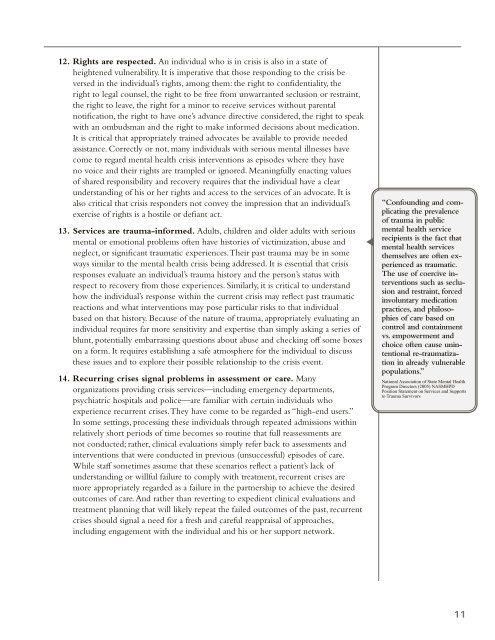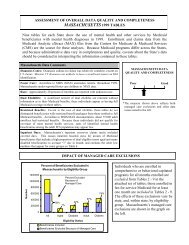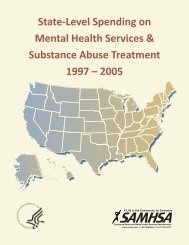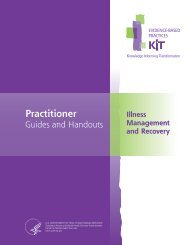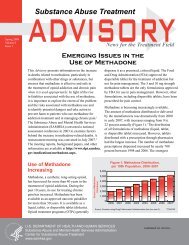Practice Guidelines: Core Elements for Responding to Mental Health
Practice Guidelines: Core Elements for Responding to Mental Health
Practice Guidelines: Core Elements for Responding to Mental Health
Create successful ePaper yourself
Turn your PDF publications into a flip-book with our unique Google optimized e-Paper software.
12. rights are respected. An individual who is in crisis is also in a state of<br />
heightened vulnerability. It is imperative that those responding <strong>to</strong> the crisis be<br />
versed in the individual’s rights, among them: the right <strong>to</strong> confidentiality, the<br />
right <strong>to</strong> legal counsel, the right <strong>to</strong> be free from unwarranted seclusion or restraint,<br />
the right <strong>to</strong> leave, the right <strong>for</strong> a minor <strong>to</strong> receive services without parental<br />
notification, the right <strong>to</strong> have one’s advance directive considered, the right <strong>to</strong> speak<br />
with an ombudsman and the right <strong>to</strong> make in<strong>for</strong>med decisions about medication.<br />
It is critical that appropriately trained advocates be available <strong>to</strong> provide needed<br />
assistance. Correctly or not, many individuals with serious mental illnesses have<br />
come <strong>to</strong> regard mental health crisis interventions as episodes where they have<br />
no voice and their rights are trampled or ignored. Meaningfully enacting values<br />
of shared responsibility and recovery requires that the individual have a clear<br />
understanding of his or her rights and access <strong>to</strong> the services of an advocate. It is<br />
also critical that crisis responders not convey the impression that an individual’s<br />
exercise of rights is a hostile or defiant act.<br />
13. services are trauma-in<strong>for</strong>med. Adults, children and older adults with serious<br />
mental or emotional problems often have his<strong>to</strong>ries of victimization, abuse and<br />
neglect, or significant traumatic experiences.Their past trauma may be in some<br />
ways similar <strong>to</strong> the mental health crisis being addressed. It is essential that crisis<br />
responses evaluate an individual’s trauma his<strong>to</strong>ry and the person’s status with<br />
respect <strong>to</strong> recovery from those experiences. Similarly, it is critical <strong>to</strong> understand<br />
how the individual’s response within the current crisis may reflect past traumatic<br />
reactions and what interventions may pose particular risks <strong>to</strong> that individual<br />
based on that his<strong>to</strong>ry. Because of the nature of trauma, appropriately evaluating an<br />
individual requires far more sensitivity and expertise than simply asking a series of<br />
blunt, potentially embarrassing questions about abuse and checking off some boxes<br />
on a <strong>for</strong>m. It requires establishing a safe atmosphere <strong>for</strong> the individual <strong>to</strong> discuss<br />
these issues and <strong>to</strong> explore their possible relationship <strong>to</strong> the crisis event.<br />
14. recurring crises signal problems in assessment or care. Many<br />
organizations providing crisis services—including emergency departments,<br />
psychiatric hospitals and police—are familiar with certain individuals who<br />
experience recurrent crises.They have come <strong>to</strong> be regarded as “high-end users.”<br />
In some settings, processing these individuals through repeated admissions within<br />
relatively short periods of time becomes so routine that full reassessments are<br />
not conducted; rather, clinical evaluations simply refer back <strong>to</strong> assessments and<br />
interventions that were conducted in previous (unsuccessful) episodes of care.<br />
While staff sometimes assume that these scenarios reflect a patient’s lack of<br />
understanding or willful failure <strong>to</strong> comply with treatment, recurrent crises are<br />
more appropriately regarded as a failure in the partnership <strong>to</strong> achieve the desired<br />
outcomes of care.And rather than reverting <strong>to</strong> expedient clinical evaluations and<br />
treatment planning that will likely repeat the failed outcomes of the past, recurrent<br />
crises should signal a need <strong>for</strong> a fresh and careful reappraisal of approaches,<br />
including engagement with the individual and his or her support network.<br />
t<br />
“Confounding and complicating<br />
the prevalence<br />
of trauma in public<br />
mental health service<br />
recipients is the fact that<br />
mental health services<br />
themselves are often experienced<br />
as traumatic.<br />
The use of coercive interventions<br />
such as seclusion<br />
and restraint, <strong>for</strong>ced<br />
involuntary medication<br />
practices, and philosophies<br />
of care based on<br />
control and containment<br />
vs. empowerment and<br />
choice often cause unintentional<br />
re-traumatization<br />
in already vulnerable<br />
populations.”<br />
National Association of State <strong>Mental</strong> <strong>Health</strong><br />
Program Direc<strong>to</strong>rs (2005) NASMHPD<br />
Position Statement on Services and Supports<br />
<strong>to</strong> Trauma Survivors<br />
11


